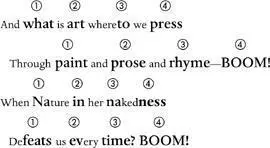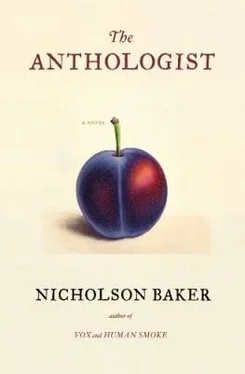That's Lear again. Hear it? You can't help but hear it. Four beats in each line. That's the classic rhythm in poetry, and in songs, four beats. Don't let anyone tell you different.
And what is Art whereto we press
Through paint and prose and rhyme-
When Nature in her nakedness
Defeats us every time?
You've got to admit that's good. That's Kipling. Did you hear what he did? "When Nature in her nakedness defeats us every time." Do you hear how he just drills that line right through your heart muscle? The "nay" of Nature and the "nay" of nakedness just push right through and screw you to the back of your chair. Oh, Rudyard, you were good in the 1890s. You were a nineties man.
But notice there that Kipling's second and fourth lines have a rest. A rest on the fourth beat. Listen for the booms now.

And here's kind of a curious historical fact. Nobody, for years and years and years, centuries even, was able to say that poetry had those obvious booms. Nobody paid attention to the rests. Well, not nobody. There was a poet named Sidney Lanier, a flute player who was dying of consumption. He gave some lectures at Johns Hopkins on the musical basis of verse, but he had a fever, and he would get tired out and have to sit beside the podium and cough horribly and catch his breath and then continue-and his way of scoring rhythms was unfortunately wrong and only added further confusion. But he did understand that poems could have rests at the ends of lines.
Besides Lanier there was really nobody of any significance talking about rests in the straightforward musical sense of a place where you tap your toe without speaking. Poets had to be hearing these rests in their heads, because they wrote a million poems with them, poems of great comeliness that you can prance around to-but they didn't know that's what they were doing.
Finally came Derek Attridge, a man with a sensitive ear who taught at Rutgers. In 1982 he introduced the idea of what he called "unrealized beats" or "virtual beats." Quote unquote. In other words, rests. They're rests. How hard is that?
I almost had forgotten (rest)
That words were made for rhyme: (rest)
And yet how well I knew it- (rest)
Once upon a time! (rest)
That's Christopher Morley. A light verser. Four beats in the line, the fourth beat being a rest. I hope you can hear it.
A good way you can scan something, by the way, is by saying it softly to yourself while counting with your fingers. Don't look at the line. Memorize the line and look away from it and say it to yourself. Start with all your fingers in the air, and when you hear a beat, bring down your thumb, then your index finger, then the next finger, then the next. "I almost had forgotten, rest." Like that. That's how to do scansion like a pro. I don't recommend the accent marks that some people use over syllables-they look so pedagogical. If you want to mark a line, use underlines.
Anyway, that pattern, the four lines together, four beats for each line-sometimes with rests and sometimes without rests, sometimes with a longer third line that has a stretched-out ending that leads you right in to the last line and sometimes not-that pattern makes up what's called the common stanza or the ballad stanza, which is really the basis of English poetry. It was for Walter Scott, Wordsworth, Coleridge, Poe, Tennyson, Longfellow, all the way through to Yeats, Frost, Teasdale, Auden, Causley, Walter de la Mare, and James Fenton. Four beats is the key.
And within each beat there are subsystems of movement, duplets and triplets, waiting and breathing and sliding. It's- well, there's a lot more to be said. But we'll get to that farther on down the line.

I WENT TO BUY a tablecloth to replace the one that Roz took when she left, so that I could wash it and hang it out on the clothesline. That way if she happened to drive by she might see it hanging there.
Inside the store many women were slowly moving sideways, looking at the glassware and the placemats and the bowls. There must have been thirty women in the store, and one couple in their seventies. I moved past the couple, who were looking at a square white serving bowl with a lid. "It would be nice for soup," said the man. "Yes, true, for soup," said the woman. The man said: "Or for stew, a big country stew." And the woman said: "Yes, true, for stew." And he said, "So what do you think?" And she said, "Well, it's square. I think perhaps we should get the round one, and if they don't want it they can return it."
Finally I came to the tablecloths. There was one with a faint green viney pattern that looked like something that Roz would have possibly bought, so I grabbed it. It was heavy in my hand, and it pushed my fingernails into the soft parts of my fingertips as I held it out to the woman at the register.
When I got home I put the tablecloth on the table and had a late lunch/early dinner. I spilled some red sauce on the tablecloth, which I was happy about because I could wash it right away. I put in a load-the tablecloth, a pair of pants, a shirt, a towel, and two T-shirts, saving the underwear for another time-but by the time the load was done spinning the day was done, as Longfellow would say, and it was raining and the clothesline was swinging in the wind, so I couldn't hang anything up on it. I had to use the noisy dryer.
IT'S HARD TO HOLD IT all in your head. All the different possible ways that you can enjoy life. Or not enjoy life. And all the things that are going on. The different rug patterns. The different car designs. The different radio shows that are coming and going. The new ads. The new crop of famous people.
And then there is, of course, always, and inevitably, this spume of poetry that's just blowing out of the sulphurous flue-holes of the earth. Just masses of poetry. It's unstoppable, it's uncorkable. There's no way to make it end.
If we could just-just stop. For one year. If everybody could stop publishing their poems. No more. Stop it. Just- everyone. Every poet. Just stop.
But of course that's totally unfair to the poets who are just starting out. This may be their "wunderjahr." This may be the year that they really find their voice. And I'm telling them to stop? No, that wouldn't do.
But wouldn't it be great? To have a moment to regroup and understand? Everybody would ask, Okie doke, what new poems am I going to read today? Sorry: none. There are no new poems. And so you're thrown back onto what's already there, and you look at what's on your own shelves, that you bought maybe eight years ago, and you think, Have I really looked at this book? This book might have something to it. And it's there, it's been waiting and waiting. Without any demonstration or clamor. No squeaky wheel. It's just been waiting.
If everybody was silent for a year-if we could just stop this endless forward stumbling progress-wouldn't we all be better people? I think probably so. I think that the lack of poetry, the absence of poetry, the yearning to have something new, would be the best thing that could happen to our art. No poems for a solid year. Maybe two.
FOR INSTANCE: here's a recent New Yorker. Actually, no-it was published almost six years ago. I got it from my pile. Pretty cover, as always. Or almost always. There have been some lapses, yes.
But this is what I mean. You lift it, you hold it, you flap it. And week after week, year after year, you hold it, you flap it. And say you open it up and flip through looking for the two new poems, and no: there would be no poem on page sixty-seven. And no poem on page eighty-three. They just simply wouldn't be there.
Читать дальше














